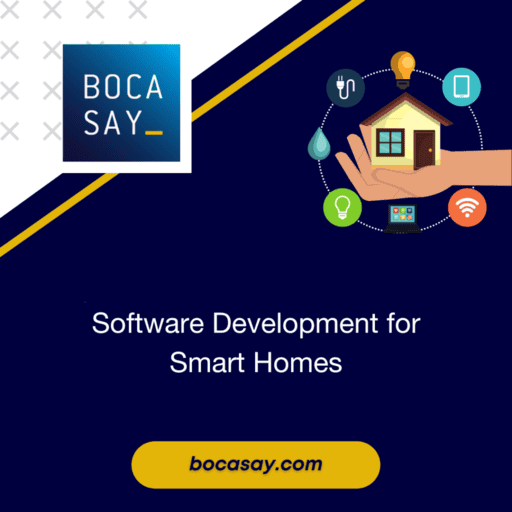Software Development for Smart Homes
Integrating software, digital devices and the internet, smart homes of the future will not only optimize our living conditions, but also offer an unprecedented amount of control for every house operation you can think of.
Ever forgot to water your plants? Turn off a light or buy eggs? Smart home automation could make forgetting house necessities a thing of the past.
At Bocasay, our expert offshore IT projects development teams use the latest technologies to constantly innovate in custom software development.
In this article, we’ll explore how smart home software will increasingly transform our homes into smart structures that can cater for our every need, optimize our energy use and free-up our time.

What is a Smart Home?
A smart home is basically any building that contains a series of interconnected Internet of Things (IoT) devices, all powered by smart home system software, in order to control and automate tasks like lighting, temperature, energy use, entertainment systems, garden watering systems and even weekly shopping.
Smart Home Benefits
Energy-Efficiency: Considering our challenges with climate change, this is by far the greatest benefit of a smart home system. It essentially offers greater control and insight regarding your energy use, enabling optimized energy efficiency and awareness of ecological factors in real-time. By automating things like temperature adjustment, lighting operation, window shutters and plant watering based on the weather, smart homes can improve our lifestyles and minimize our impact on the environment.
Control and Convenience: Imagine a home that turns on your pre-customized lighting arrangement as soon as you park your car in your garage. This is probably a home with a smart fridge that automatically orders stock-ups of your food essentials based on your customized preference lists. You’ll remember to eat your eggs before they expire because your fridge will send you a reminder on your smartphone, basically minimizing food waste.
𝔸𝕣𝕖 𝕪𝕠𝕦 𝕝𝕠𝕠𝕜𝕚𝕟𝕘 𝕥𝕠 𝕚𝕟𝕔𝕣𝕖𝕒𝕤𝕖 𝕥𝕙𝕖 𝕢𝕦𝕒𝕝𝕚𝕥𝕪 𝕠𝕗 𝕪𝕠𝕦𝕣 𝕡𝕣𝕠𝕛𝕖𝕔𝕥𝕤 𝕨𝕚𝕥𝕙 𝕒 𝕥𝕖𝕔𝕙𝕟𝕚𝕔𝕒𝕝 𝕥𝕖𝕒𝕞 𝕦𝕡 𝕥𝕠 𝕕𝕒𝕥𝕖 𝕠𝕟 𝕥𝕙𝕖 𝕝𝕒𝕥𝕖𝕤𝕥 𝕥𝕖𝕔𝕙𝕟𝕠𝕝𝕠𝕘𝕚𝕖𝕤 𝕒𝕟𝕕 𝕗𝕣𝕒𝕞𝕖𝕨𝕠𝕣𝕜𝕤? 𝕃𝕠𝕠𝕜 𝕟𝕠 𝕗𝕦𝕣𝕥𝕙𝕖𝕣, 𝔹𝕠𝕔𝕒𝕤𝕒𝕪’𝕤 𝕥𝕖𝕒𝕞 𝕠𝕗 𝕕𝕖𝕧𝕖𝕝𝕠𝕡𝕖𝕣𝕤 𝕒𝕣𝕖 𝕙𝕖𝕣𝕖 𝕥𝕠 𝕙𝕖𝕝𝕡 𝕪𝕠𝕦! 𝔸𝕤𝕜 𝕗𝕠𝕣 𝕪𝕠𝕦𝕣 𝕗𝕣𝕖𝕖 𝕢𝕦𝕠𝕥𝕖!
Basic Components of Smart Homes
A smart home is basically a tech-ecosystem that establishes pleasant and secure home environments, enabling users to better manage their households and save a lot of time on everyday house chores. Within a smart home system, there are three key components:
- A hub.
- Sensors.
- Actuators.
In between them, there is a communication protocol that enables data exchange and remote management of devices.
Hub: This is the brain of your smart home system. It is where the user-administrator can control all communication between smart devices, sensors, their processes and data. It normally arrives in the form of a smartphone app that allows the user to remotely control all smart home devices manually, or to set-up automated responses.
Sensors: Smart sensors are low-powered devices that can detect changes in environmental conditions such as temperature, humidity, movement, pressure and many others. Data collected by sensors is automatically transferred to the hub which determines what action must be performed.
Actuators: Actuators are smart devices that perform commands received from the smart home hub. Examples can include devices like smartwatches, televisions, virtual assistants, automatic window shutters and irrigation systems.
Smart Home Software Development
While smart home software application potential is endless, software development demand for smart home systems is generally divided into the following focus areas:
Security 🔐
Smart homes deploy digital technology to ensure efficient home security and surveillance. One of the most common IoT devices integrated into a smart home system is a smartphone-controlled surveillance camera. There are also smart doorbells that allow you to communicate with visitors even if you are not at home. Smart home security systems can deliver real-time notifications of any suspicious activity near your house, powered by an integration of home camera surveillance, motion sensors, police reports and other data. Software solutions that can provide remote home monitoring and operation will only continue to be in high demand.

Climate 🌡️
Fully customizable climate control is another exciting characteristic of a smart home. Essential home automation features of smart homes include the control of temperature, humidity and air quality. Smart thermostats, remotely controlled, allow users to preheat or pre-cool their homes just before arriving, significantly improving energy efficiency. In addition, there are many smart home apps dedicated to the monitoring of energy consumption, enabling users to both save money on electricity bills, as well as establish a more sustainable pattern of long-term power consumption.
Automation ✅
Whether it’s asking your virtual assistant to provide a quick weather report, or relying on your smart pet-feeder to feed your cats while you are on holiday, smart homes are full of integrated devices that can automate a series of tasks. From motion sensors able to to turn specific lights on, all the way to automated water sprinklers that can perform according to real-time weather data, a wide range of house chores can be taken care of through smart home software development. Tech giants like Microsoft have already launched systems like HomeOS, a home automation operating system.
Entertainment 🎭
With no signs of slowing down, digital technology and its gradual integration into every aspect of home life has taken home entertainment systems to a whole new level. Smart televisions and audio systems can be triggered to operate either through user voice commands or specific hand gestures. Without almost lifting a finger, users of smart home entertainment systems can be reminded of their favorite TV shows, and instantly browse through music and movie libraries without having to locate cumbersome devices such as handheld remote controls. (Most of the time, just having your smartphone should be more than enough to perform any task and resolve any issue)
Benefits of Offshore Agencies for Smart Home Software Development
Is your company considering the launch of a new smart home software product? Depending on their specific needs, capabilities and market sectors, companies around the world have a wide range of reasons for why they prefer outsourcing their offshore IT projects development to offshore IT centers, instead of hiring in-house development teams. Here is a list of the main reasons:
→ Limited availability of skilled and in-country IT developers
→ Limited financial resources
→ Unable to provide scalability and flexibility
→ Looking for specific skill sets
→ Lack of productivity caused by inefficiency
→ Need to provide 24-hour services